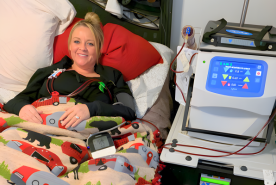Palliative care supports kidney patients by managing symptoms, easing emotional stress, and improving quality of life. It's available at any stage and complements other treatments.
By Jennifer S. Scherer, M.D.
A few years ago, I left my nephrology private practice because I was driven to do more for my patients. Throughout my training and career in nephrology, I had been intensely aware of how kidney patients – even those doing well – often have poor quality of life. I wanted to ease the physical symptoms and emotional distress experienced by my patients, and also to lighten the heavy load carried by caregivers. Understanding this led me to pursue additional training in palliative care. Today, I lead an integrated nephrology and palliative care outpatient program at Langone Health, called Kidney CARES, to support people living with kidney disease.
Who is on the palliative care team?
Palliative care is team-based medical care for people living with serious illnesses, such as kidney disease. A typical palliative care team is made up of palliative care specialists, including doctors, nurses, and social workers, who work in partnership with your other doctors to give you an added layer of support. The goal is to improve quality of life for our patients and their families by treating the pain, symptoms and emotional stress of the illness, and providing important support for making decisions. You can ask for palliative care at any age and any stage of your disease, and it can be given alongside all your other treatments.
In our clinic at NYU Langone, for example, we work closely with the kidney doctors. While your kidney specialist focuses on preventing the progression of your kidney disease, the palliative care team works with him or her to consider the bigger picture and to improve your quality of life. Whether you have chosen dialysis or to carefully manage your disease without dialysis, we treat your pain and symptoms so that you can achieve the best possible quality of life on whatever treatment pathway you choose.
Why is palliative care important?
We take extra time to understand what is important to you; we help you understand the progression of your disease and your treatment options; and we help you make informed choices that match up with your goals. Our team includes a 24-hour telephone support that patients and families can call for help with symptoms or questions as they arise – often helping to avoid a trip to the emergency room. We also provide support for caregivers, usually family members who are living with anxiety and stress resulting from caring for their loved one.
We recommend that all kidney patients receive a palliative care consultation as early as possible – soon after diagnosis – to help you and your family build a treatment plan that makes sense for you. The early consultation allows us to establish a relationship with you and to understand your goals, so that you are prepared and feel supported when symptoms become more severe.
Palliative care is available in almost all large hospitals, in some outpatient clinics like the one we run at NYU Langone, and in some areas, for home visits. Talk to your kidney doctor about a referral to palliative care, or search for providers in the Palliative Care Provider Directory on getpalliativecare.org.
About the author:
Jennifer Scherer is an assistant professor of clinical medicine at NYU School of Medicine in both the Divisions of Palliative Care and the Division of Nephrology. She completed her nephrology fellowship in 2010 at the Albert Einstein College of Medicine/Montefiore Medical Center. She then went on to practice nephrology in a community practice in Westchester County for three years. She left practice and completed a palliative care fellowship at the Icahn School of Medicine at Mount Sinai in 2014. She is board certified in both specialties and clinically practices both at NYU Langone Health. Her clinical and research interests are in the development of models of care for patients with advanced kidney disease that integrate palliative care into routine nephrology care with a focus on quality of life. She has opened an outpatient interdisciplinary renal palliative care program at NYU Langone called the Kidney CARES (Comprehensive Advanced renal disease and ESRD Support) Program. She is a recipient of a palliative care leadership award through the Cambia Health Foundation Sojourn’s Scholar Leadership Program. Dr. Scherer has served on the Public Policy Committee for the American Society of Nephrology as well as for the American Academy of Hospice and Palliative Medicine. She also is a member of the planning committee for the Allison Norris Symposium. This symposium occurs every two years and focuses on patient centered topics in the field of Nephrology.








